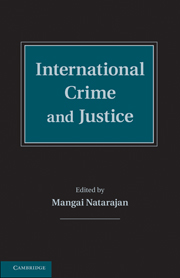Book contents
- Frontmatter
- Contents
- List of Figures
- List of Tables
- List of Contributors
- Foreword
- Preface
- Introduction
- Part I International Criminology
- Part II Law, Punishment, and Crime Control Philosophies of the World
- Part III Transnational Crime
- Part IV Organized Crime and Terrorism
- Part V International crime
- Part VI Delivering International Justice
- Part VII International Cooperation and Criminal Justice
- Part VIII International Research and Crime Statistics
- Part IX International research resources
- World Map
- Index
Part III - Transnational Crime
Published online by Cambridge University Press: 05 October 2014
- Frontmatter
- Contents
- List of Figures
- List of Tables
- List of Contributors
- Foreword
- Preface
- Introduction
- Part I International Criminology
- Part II Law, Punishment, and Crime Control Philosophies of the World
- Part III Transnational Crime
- Part IV Organized Crime and Terrorism
- Part V International crime
- Part VI Delivering International Justice
- Part VII International Cooperation and Criminal Justice
- Part VIII International Research and Crime Statistics
- Part IX International research resources
- World Map
- Index
Summary
Transnational crimes are criminal acts and transactions that span national borders. Globalization and advances in technology have led to a vast increase in these often complex crimes that include cybercrimes, international money laundering, and various forms of trafficking. Drug trafficking is perhaps the preeminent transnational crime. Ever since the Shanghai convention in 1909, the serious threat to human well-being caused by drug abuse has led nations around the world to take action to deal with their drug problems. Indeed, for many decades drug trafficking absorbed most of the United Nations’ efforts devoted to the control of transnational crimes. More recently, recognition of the wide-scale violations of human rights resulting from trafficking of humans, especially of women and children for sexual exploitation and servitude, have galvanized international cooperation. But countries whose laws have been violated do not always have an equal interest in stopping transnational crimes. For example, some poorer countries may turn a blind eye to the illegal migration of their nationals seeking employment in wealthier countries. This is because the migrants often remit a large portion of their earnings back home, thus benefiting the local economy.
Transnational crimes involve multiple offenders and often a string of crimes that facilitate traficking or smuggling operations. For example, money laundering, which involves converting or concealing the financial proceeds of crime, cannot usually be accomplished by a single act. It typically consists of a process of sequential acts that cross the borders of two or more countries. These sequential acts often involve fraud and corruption – notoriously difficult crimes to police. Understanding the factors that promote and facilitate transnational crimes is crucial for developing effective control and prevention strategies. Traditional criminological explanations of transnational crime involve a variety of macrolevel national indicators such as development and modernization, poverty and deprivation, inequality and economic dependency, and discrimination and anomie.
- Type
- Chapter
- Information
- International Crime and Justice , pp. 107 - 108Publisher: Cambridge University PressPrint publication year: 2010



